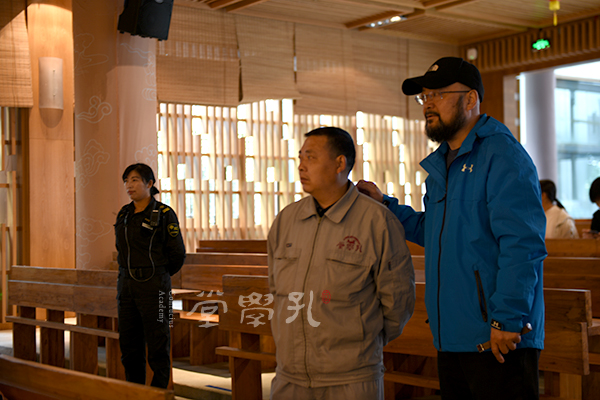

During Qingming Festival in April 2019, Guiyang music master Qu Xiaosong returned to his hometown and entered Guiyang Confucius Academy, where he held two music lectures with the respective themes of “Appreciation and Analysis of the Song A Heart” and “Appreciation and Analysis of the Symphonic Choral Work Dunhuang Soul”. In the lectures, Mr. Qu Xiaosong played multiple roles: speaker and singing guest. Sometimes he sang softly; sometimes he clapped on the table, and incarnated into various roles in the music scene. The audience praised him for “speaking well and singing better”. He won warm applause in the scene when performing the emotional peak.

Silence, the unique true temperament in music
If you have any contact with modern Chinese music, Mr. Qu Xiaosong cannot be ignored. In the 1980s, he was definitely a man of the hour in China’s funky music. Qu Xiaosong, Ye Xiaogang, Guo Wenjing and Tan Dun were called the “Four Talents” of the Central Conservatory of Music. Most people living in that era heard his music. Qu Xiaosong was crowned “Master of Silence” by western music critics. His music is really “silent” and “music is like a floating cloud, coming and going; only the sky is silent, and the sound comes from the sky and goes back to the sky...” Different from the previous Gossip of Music, Mr. Qu Xiaosong’s silence has changed from the vision to heart in his new book “Nature of Music Sounds”–“clouds drift away and sounds fade away, but silence remains...”. The Dunhuang Soul was played in the lecture site. There were many “music blanks” in Dunhuang Soul, but it was full of tension and touched the depths of human hearts from time to time.

Tolerance, the tradition under continuous development
“Don’t be traditional on purpose. Tradition is alive and developing.” As for how to innovate and inherit Chinese music, Mr. Qu Xiaosong took Dunhuang culture as an example in the context of the integration of Chinese and western cultures and believed that even if there were cultural conflicts, the mainstream of integration could not be concealed. Mr. Qu Xiaosong believed: “Chinese traditional music has too many unsolved mysteries and excellent ideas. What the music institutes can do is to teach common things of music. For folk music with personality, only when we really enter into the traditional music can we capture new creative inspiration, realize the unique beauty contained in folk music, be infected and intoxicated, and generate profound experience.” In his creative ideas, Mr. Qu Xiaosong not only regards the expression of traditional Chinese culture as an artistic ideal and persistent pursuit, but also constantly absorbs the nourishment of various cultures and arts. In the process of learning and absorbing multi-cultures, the national cultural features of music have been highlighted, which has brought some enlightenment to today’s music creation.

Original ecology and dialect make Guizhou music more alive
Speaking of unique factors in the development of Guizhou music, Mr. Qu Xiaosong was immediately excited. “Dialect is very attractive and has strong musicality. The corresponding positions of Guizhou and Sichuanese dialects can be found in the pentatonic scale. The songs in Guizhou dialect are all wonderful.” Mr. Qu Xiaosong believed that the combination of Guizhou original ecology music and dialect could create a new pattern and enrich the music world. Compared with the experience of holding lectures in universities, Mr. Qu Xiaosong said that he preferred the atmosphere of Confucius Academy. “Different from professional colleges, people on the scene ask questions freely and exchange various ideas. I enjoy lectures in Confucius Academy more and feel more comfortable.”
Mr. Qu Xiaosong was surprised when entering Confucius Academy for the first time. He was astonished at the rapid development of cultural construction in his hometown, and expressed his expectation for more in-depth cooperation in holding solo concert.